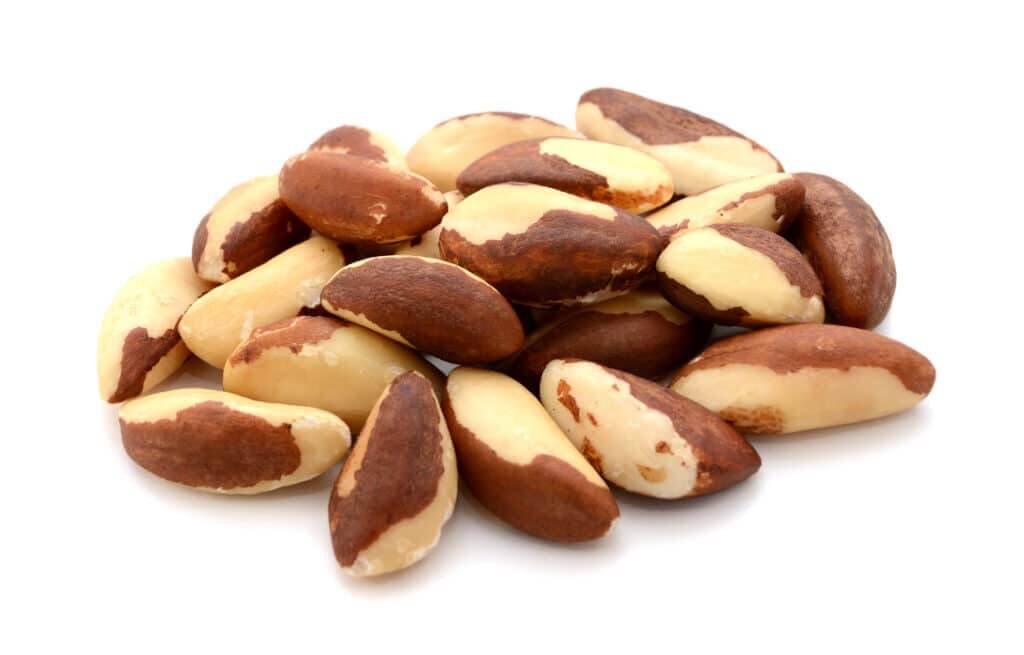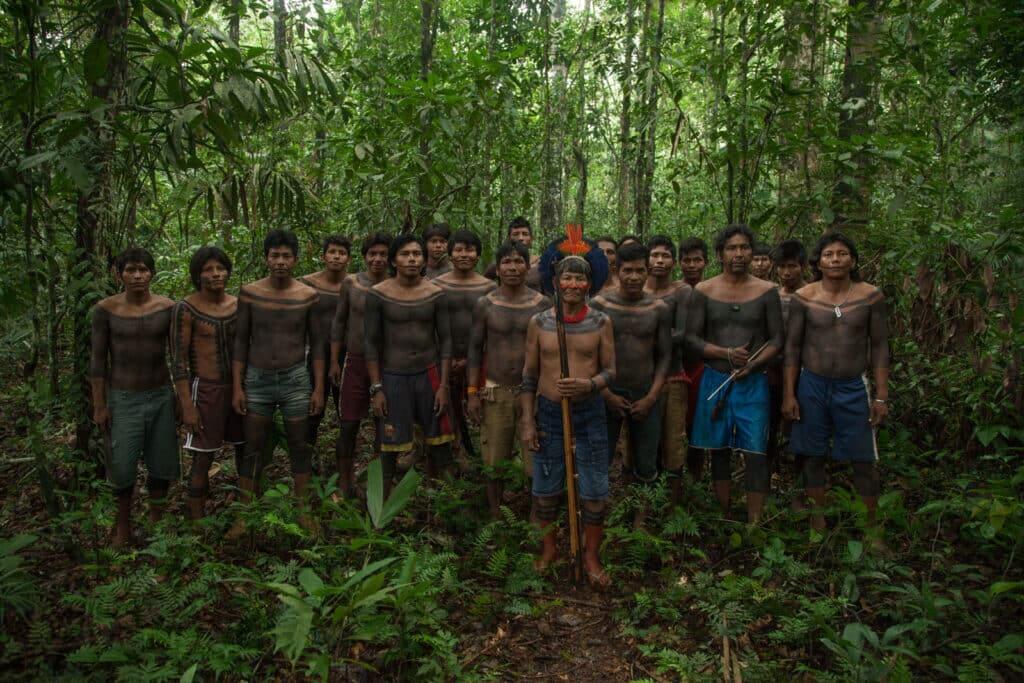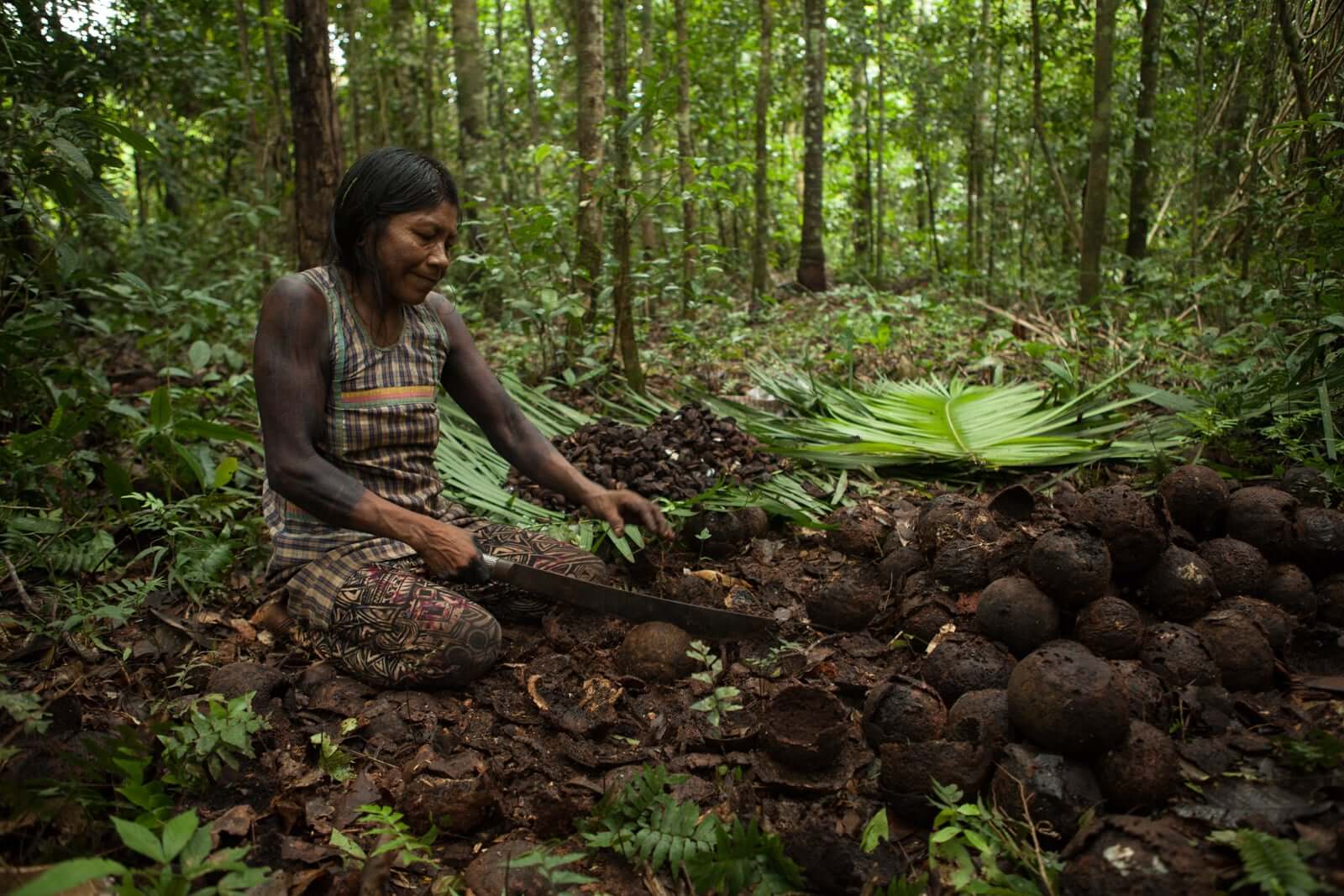Imagine that you could use the power of your pocket to help ensure the survival of Brazil’s indigenous Kayapó people and the Amazon rainforest they live in. And even help save the nutritious Brazil nut, too. East Anglia-based ethical food retailer Hodmedod has come up with a novel way of enabling British consumers to do just that – by selling wild Brazil nuts that have been harvested by the Kayapó and brought to the UK by ship.
The selenium-rich Brazil nuts, labelled with their Kayapó name PI’Y, have launched this week on Hodmedod’s website at £3.99 for a 175g pouch, or £17.95 for a one kilo bag. The nuts are part of a six-tonne trial shipment which, if the nuts sell well, will be followed by another in the autumn. So far, the signs are good: in the first weekend of going on sale, Hodmedod sold over a quarter of a tonne.
The initiative is pioneered by Hodmedod in cooperation with The Landworkers’ Alliance, The Roddick Foundation and Kayapó-led cooperative Cooba-y. And, according to Hodmedod, it will help provide financial autonomy for around 600 families in over 50 Kayapó villages and protect the 40,000 square miles of Amazon rainforest alongside the Xingu river where the Kayapó live. Part of the income from the sale of the nuts will be used to fund guard posts that monitor and protect the 1,375 miles of border demarcating the Kayapó’s forested territory.
“People assume that now [ex-President] Bolsonaro is gone and Lula da Silva is president, things are okay in Brazil,” says Hodmedod’s co-founder Josiah Meldrum. “But the Amazon forest and its indigenous peoples are still threatened. Importing Brazil nuts direct from the Kayapó feels like a really positive and straightforward way to support the long-term future of both.”
The Kayapó, one of the largest indigenous groups in Brazil, have been harvesting Brazil nuts for generations and the nuts form an important part of their diet and culture. The kidney-shaped nuts are cased like orange segments inside hairy woody pods that resemble coconuts.
People assume that now Bolsonaro is gone and Lula da Silva is president, things are okay in Brazil. But the Amazon forest and its indigenous peoples are still threatened. Josiah Meldrum, co-founder of Hodmedod
Brazil nuts are a highly sustainable crop, as harvesting them does not necessitate the felling of the tall (often over 30 metres high) trees which produce them. These trees and the soil they grow in absorb and store vast amounts of carbon, so are vital for climate stability, too.
Meldrum says the idea to import and market the nuts in the UK emerged when Jyoti Fernandes, campaigns coordinator at The Landworkers’ Alliance, attended the Piaraçu Indigenous Summit in the Amazon in 2020, which brought together more than 600 Indigenous peoples to unite against the Brazilian government’s campaign of genocide, ethnocide and ecocide. “When asked how how the UK could support Indigenous justice, the reply was to build a regenerative supply chain for rainforest products,” he says. “Most importantly that initiative came from the indigenous people rather than from us.”
After a follow-up trip to the Amazon in 2022, Fernandez returned to the UK determined to establish a direct trading relationship with the Kayapó. Hours after getting off the plane she met Meldrum, handed him a couple of Brazil nuts to nibble, and the plan to sell them via Hodmedod was hatched.

“Trade can be exploitative, and modern supply chains which have negative ecological, health and social impacts are rightly vilified,” she explains. “But it doesn’t have to be that way. This solidarity trading partnership does things differently.”
The Brazil nut pods are collected by Kayapó families once they’ve fallen to the ground during the fruiting season from December to March. Families often set up temporary camps to carry out the harvest – important in itself for preserving and communicating indigenous values and culture. Locating Brazil nut groves, navigating often long distances through forest and harvesting the nuts relies on knowledge and skills passed down for generations. At the same time, the Kayapó can monitor their vast homelands for illegal logging or mining.

Harvesters remove the fallen pods, break them open with precise machete blows, and remove the seeds (nuts) inside. The nuts are then placed in big bags and carried to boats which transport them to warehouses. They are then taken by truck to factories in Brasilia to be shelled.
The wild nut tree depends on two creatures to survive. The first is a rodent called an agouti, which is the only animal in the forest capable of penetrating the nuts’ casings (by gnawing a hole). Like squirrels, the rodents bury some nuts for a rainy day, ensuring they are dispersed and can then grow into trees. For pollination, the tree depends on another creature: a specific species of large bee that only survives in undisturbed primary forest. Destroy that forest, we’d have no bees and the Brazil nut would become extinct.
Trade can be exploitative, and modern supply chains which have negative ecological, health and social impacts are rightly vilified,” she explains. “But it doesn’t have to be that way. Jyoti Fernandez, campaigns coordinator at The Landworkers’ Alliance
Brazil nuts are hugely nutritious. In addition to offering protein, fibre, niacin and vitamin B6, they are rich in selenium which helps thyroid health and reduces inflammation in the body; one Brazil nut contains enough selenium to meet your daily needs. The nut is also rich in magnesium and other minerals.
If the Brazil nut pilot proves successful, Hodmedod and its partners may consider importing other sustainably harvested rainforest crops. As consumers we can choose to make this new type of trading work, using the power of our pockets to save the Amazon rainforest, its indigenous inhabitants and the Brazil nut itself. We’d be nuts not to.









This sounds a great idea which we need to support.